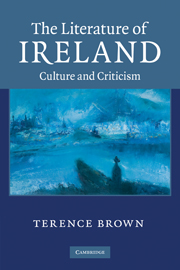Book contents
- Frontmatter
- Contents
- Acknowledgements
- Introduction
- 1 The Literary Revival: historical perspectives
- 2 Joyce's magic lantern
- 3 Music: the cultural issue
- 4 Modernism and revolution: rereading Yeats's ‘Easter 1916’
- 5 Shakespeare and the Irish self
- 6 Irish literature and the Great War
- 7 Ireland, Modernism and the 1930s
- 8 Post-modernists: Samuel Beckett and Flann O'Brien
- 9 Patrick Kavanagh: religious poet
- 10 MacNeice's Irelands: MacNeice's islands
- 11 Louis MacNeice and the Second World War
- 12 MacNeice and the puritan tradition
- 13 John Hewitt and memory: a reflection
- 14 Michael Longley and the Irish poetic tradition
- 15 Seamus Heaney: the witnessing eye and the speaking tongue
- 16 Derek Mahon: the poet and painting
- 17 Telling tales: Kennelly's Cromwell and Muldoon's ‘The More a Man Has the More a Man Wants’
- 18 Redeeming the time: John McGahern and John Banville
- 19 ‘Have we a context?’: transition, self and society in the theatre of Brian Friel
- 20 Hubert Butler and nationalism
- 21 The Irish Dylan Thomas: versions and influences
- Index
- References
20 - Hubert Butler and nationalism
Published online by Cambridge University Press: 05 June 2012
- Frontmatter
- Contents
- Acknowledgements
- Introduction
- 1 The Literary Revival: historical perspectives
- 2 Joyce's magic lantern
- 3 Music: the cultural issue
- 4 Modernism and revolution: rereading Yeats's ‘Easter 1916’
- 5 Shakespeare and the Irish self
- 6 Irish literature and the Great War
- 7 Ireland, Modernism and the 1930s
- 8 Post-modernists: Samuel Beckett and Flann O'Brien
- 9 Patrick Kavanagh: religious poet
- 10 MacNeice's Irelands: MacNeice's islands
- 11 Louis MacNeice and the Second World War
- 12 MacNeice and the puritan tradition
- 13 John Hewitt and memory: a reflection
- 14 Michael Longley and the Irish poetic tradition
- 15 Seamus Heaney: the witnessing eye and the speaking tongue
- 16 Derek Mahon: the poet and painting
- 17 Telling tales: Kennelly's Cromwell and Muldoon's ‘The More a Man Has the More a Man Wants’
- 18 Redeeming the time: John McGahern and John Banville
- 19 ‘Have we a context?’: transition, self and society in the theatre of Brian Friel
- 20 Hubert Butler and nationalism
- 21 The Irish Dylan Thomas: versions and influences
- Index
- References
Summary
One of the most poignant, yet unsettling, of Hubert Butler's essays is his short evocation of the social ambiance of Riga Strand in 1930 which stands at the head of his second Lilliput collection, The Children of Drancy (1988). A text of the Great War's aftermath, it reminds one of the atmospherics of the opening section of T. S. Eliot's The Waste Land, published eight years earlier, with a cosmopolitan caste of Eastern Europeans cast up on a shore where history had so recently been at its terrible full tide. Eliot's poem had been moodily attentive to the déraciné voices of those left behind as the waters of empire subsided, following the cataclysm of 1914–18. Butler, in ‘Riga Strand in 1930’, brings more of a realist's eye to social anomalies to be observed in the young and fragile Latvian republic that had carved out a temporary space and peace for itself after the deluge. For, Butler remarks (intrigued by a social mix lost on departing Russian officers and merchants frustrated by ‘the petty officialdom of a young nation, proud of its new independence and snatching at all opportunities of asserting it’):
All the same Riga Strand must have a fascination for more leisured visitors, who have time to be interested in the past and the future of the small republics which rose from the ruins of the Russian Empire. It is the holiday ground not only for the Letts but for all the newly liberated peoples of the Baltic. There one may meet Estonians and Finns, Lithuanians and Poles, bathing side by side with Germans, Russians and Swedes, who were once their masters.
- Type
- Chapter
- Information
- The Literature of IrelandCulture and Criticism, pp. 252 - 259Publisher: Cambridge University PressPrint publication year: 2010



